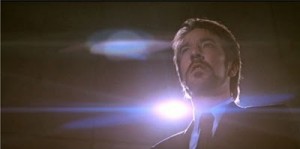On AFI’s list, “100 Years, 100 Heroes and Villains,” the latter group seems to be sub-divided into two main categories. One is that of the madman, whose behavior is generally violent and erratic, such as Annie Wilkes, The Joker, and Freddy Krueger. The second, however, is comprised of the cool, calculating antagonist, along the lines of Harry Lime, Mrs. Danvers, and Hannibal Lechter. It’s always been these that are the more fascinating to me, as they function far more as counterpoints to the protagonist. We can frequently see their points of view, or at the very least enjoy the way in which they go about getting what they want. They’re sociopaths, usually, but a little part of us dies if they do, since we can’t help but admire them. Most who know me probably already know where I’m going with this… for today’s “Best Villain,” there’s never been one more appealing to me than Hans Gruber in Die Hard.
 There are many reasons why I think Die Hard is one of the greatest action films of all time, but it’s best explained by discussing its adherence to the Aristotelian Unities. I’m being absolutely serious when I say this: Die Hard is mostly structured according to the classic rules for drama demanding unity of time, space, and action. It takes place in one night. The main part of the action all occurs in one building (yes, and its parking garage, and the street below, but still). There is one focus of the plot, and that’s the terrorist takeover of the building and its thwarting by John McClane. It’s this simplicity that makes the action so breathtaking; we don’t have to worry about any complicated reasoning by the characters or understand anyone’s motivations to know where it’s all going, so each sequence is heightened in importance, and ultimately more satisfying.
There are many reasons why I think Die Hard is one of the greatest action films of all time, but it’s best explained by discussing its adherence to the Aristotelian Unities. I’m being absolutely serious when I say this: Die Hard is mostly structured according to the classic rules for drama demanding unity of time, space, and action. It takes place in one night. The main part of the action all occurs in one building (yes, and its parking garage, and the street below, but still). There is one focus of the plot, and that’s the terrorist takeover of the building and its thwarting by John McClane. It’s this simplicity that makes the action so breathtaking; we don’t have to worry about any complicated reasoning by the characters or understand anyone’s motivations to know where it’s all going, so each sequence is heightened in importance, and ultimately more satisfying.
But back to the subject at hand. Gracefully sweeping through the center of this simple structure is a complex and businesslike mastermind in Gruber. He’s European chic, dashing, well-spoken, dressed to the nines, and his scheme is meticulously planned. He’s seemingly a terrorist who has some shadowy goal in mind, the sincerity of which we doubt from the very beginning. At first it seems as though the liberation of whosits and whatever-they’re-called is going to be a MacGuffin – a primarily Hitchcockian term for some plot device or object about which the characters care a great deal, but the audience couldn’t care less – but, have no fear, the simplicity is not actually at stake. He’s there to steal a great deal of money, of course, and what could be more comfortingly ordinary? What could be more fantastically impressive than his doing so on the scale at which he’s operating? What could be more brilliant than: “I am an exceptional thief, Mrs. McClane. And since I’m moving up to kidnapping, you should be more polite.” We know the movie is going somewhere with Hans Gruber. He’s in charge, and a part of us wants to see him brush aside any and all of the idiots standing in his way.
Of course, he’s the perfect foil to John McClane, the nearly-everyman New York cop, an everyday hero who you could say was as American as apple pie, but you’d risk an eye-roll from him at the sentimentality. We don’t actually care about McClane’s relationship with his wife as much as we do that which he has with Hans; there’s real chemistry there. Alan Rickman has had a long and glorious career playing the smartest, most sophisticated man in any room, whose exasperation knows no bounds. Hans can kill without emotion, his only qualm whether or not doing so will put the money he seeks further out of reach. He’s as sane as you or I, with the capacity for sheer annoyance at his plans being derailed and having to break a sweat that will surely ruin his suit. When that safe opens at the culmination of all his efforts, we’re thrilled at the wonder and satisfaction on his face.
I happened to have the pleasure of meeting Rickman once, and my idiotic, unsophisticated twenty-three year old self breathlessly asked him about this movie (seriously, it’s a blur exactly what I said, but I somehow asked Alan Rickman about Die Hard to his face). He was terribly gracious about it, and talked to me for a few minutes about how the script had sucked at first, and he’d not agreed to do it until they’d expanded the part of the wife, etc… It was clear that he knew he was the best part of the movie, and that confidence was incredibly refreshing and appealing. It’s that which infuses Hans and makes us truly disappointed that he and McClane can’t both succeed in the end. I remember seeing the sequel and gasping at the mere seconds showing his final fall in flashback. Just the specter of Hans Gruber in that film (which was no comparison to the original – but then, they’d abandoned the unities!), was enough to thrill.